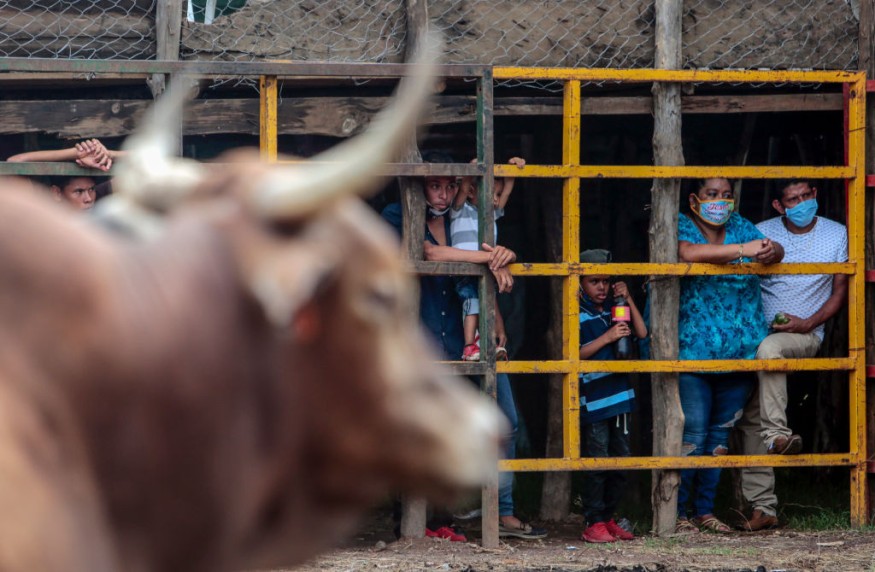Mexico Legislators Seek to Ban Bullfighting

Bullfights in Mexico City this season may be the last, as legislators seek to reintroduce a bill banning the activity.
Protesters, as has become routine, marked the end of the season on Sunday at the city's Plaza de Toros México, the world's largest bullfighting arena.
Legislators Worried By Potential Revenue Loss - Says Animal Welfare Commission
The assembly's Animal Welfare Commission gave preliminary approval to a measure last year that would prohibit public gatherings during which "animals are subject to mistreatment and cruelty" that results in their death, but the bill never made it to the entire assembly for a vote, per ABC News.
Alberto Luvianos, an animal rights activist, believes legislators were scared off by the potential loss of income. He estimated the fights create about 3,000 jobs.
The real number is ten times that amount, according to bullfighting associations.
Evangelina Estudillo is concerned about the possibility of a ban, since she has been a street vendor outside of the arena for 20 years, and the income has helped her raise her nine children.
Estudillo said that many families rely on bullfighting and that the "president would have to do something."
Another vendor, Paco Dominguez stated that while he respects individuals who are against it, he does not agree with the banning.
Dominguez, who sells bullfighting merchandise and posters, sees it as an "art, a part of culture."
Bullfights - known colloquially as la fiesta brava - have been banned in four Mexican states since 2013, and polls show widespread support for the prohibition. A ban in Mexico City, currently the largest venue for the events, would be a setback for bullfighting on a global scale.
Bullfighting Believed To Be "Already Dying On Its Own"
Although advocates of the proposed ban on the sport were outnumbered by spectators in the Plaza México arena last December 2021, they believed they would not have to protest much longer.
The organizer of the protest at the last bullfight of the season, Manuel León de Judá said the sport is "already dying on its own."
According to León de Judá, the arena only fills up on special days, such as the day they protested, the Day of the Virgin of Guadalupe, but it is entirely deserted on other days.
The figures from La Guadalupana, the season's final bullfight, may back up the allegation. Officials from the Plaza estimated that just over 20,000 people attended, which is somewhat less than half of the arena's full capacity of roughly 42,000.
Nonetheless, supporters claim that the centuries-old tradition is still alive and well in Mexico.
Bullfighting is deeply rooted in all civic, religious, and holiday season festivals in both cities and towns across Mexico, according to Manuel Sescosse, who serves on the executive board of the Mexican Bullfighting Association
He cited the sport's economic worth to society as a reason why it should not be banned: 7 billion pesos in annual revenue; 18,000 direct and 80,000 indirect employment produced; and an increase of 800 million pesos in annual taxes paid.
Outside the stadium before matches, much is made of the sport's importance to other people who benefit from it, such as taco and beer vendors and sellers of bullfighting-themed merchandise. Bullfights, on the other hand, do not make up the entirety of such businesses.
While the subjective worth of the sport is entirely in the eyes of the beholder, critics see such claims of artistry as a ploy for finding amusement in what is undeniably the horrific and gruesome death of a living creature.
Outside the event, León de Judá and the other vegan protesters remarked that watching a bullfight masks a deeper emotional instability.
"Every serial killer begins by torturing animals," said León de Judá.
He added that it has been proven that someone who watches a bull being killed for entertainment has the same psychological profile as a murderer.
READ MORE: Argentina: 5 Traditional Foods You Have to Try to Get a Taste of Argentine Culture
This article is owned by Latin Post.
Written by: Jess Smith
WATCH: Mexico City considers ban on bullfighting - from Al Jazeera English
Subscribe to Latin Post!
Sign up for our free newsletter for the Latest coverage!

















